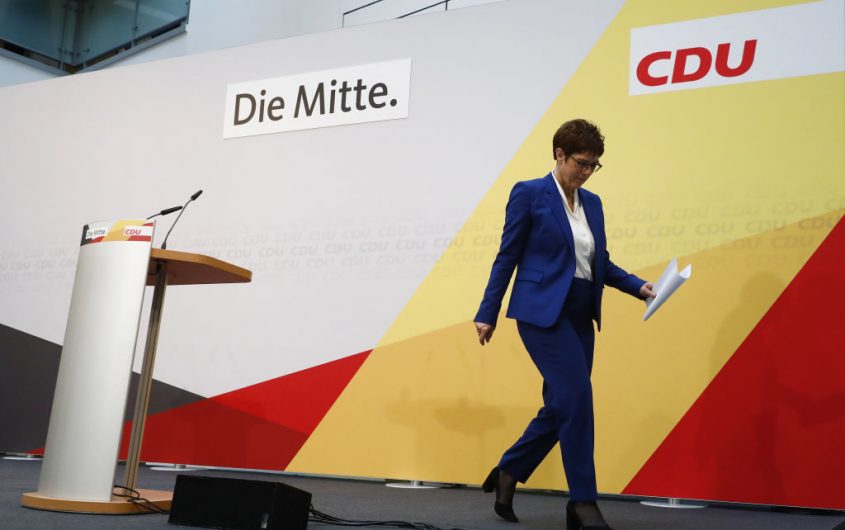
Photo by Michele Tantussi/Getty Images
The Fall of Annegret Kramp-Karrenbauer

Eric Langenbacher
Senior Fellow; Director, Society, Culture & Politics Program
Dr. Eric Langenbacher is a Senior Fellow and Director of the Society, Culture & Politics Program at AICGS.
Dr. Langenbacher studied in Canada before completing his PhD in Georgetown University’s Government Department in 2002. His research interests include collective memory, political culture, and electoral politics in Germany and Europe. Recent publications include the edited volumes Twilight of the Merkel Era: Power and Politics in Germany after the 2017 Bundestag Election (2019), The Merkel Republic: The 2013 Bundestag Election and its Consequences (2015), Dynamics of Memory and Identity in Contemporary Europe (co-edited with Ruth Wittlinger and Bill Niven, 2013), Power and the Past: Collective Memory and International Relations (co-edited with Yossi Shain, 2010), and From the Bonn to the Berlin Republic: Germany at the Twentieth Anniversary of Unification (co-edited with Jeffrey J. Anderson, 2010). With David Conradt, he is also the author of The German Polity, 10th and 11th edition (2013, 2017).
Dr. Langenbacher remains affiliated with Georgetown University as Teaching Professor and Director of the Honors Program in the Department of Government. He has also taught at George Washington University, Washington College, The University of Navarre, and the Universidad Nacional de General San Martin in Buenos Aires, Argentina, and has given talks across the world. He was selected Faculty Member of the Year by the School of Foreign Service in 2009 and was awarded a Fulbright grant in 1999-2000 and the Hopper Memorial Fellowship at Georgetown in 2000-2001. Since 2005, he has also been Managing Editor of German Politics and Society, which is housed in Georgetown’s BMW Center for German and European Studies. Dr. Langenbacher has also planned and run dozens of short programs for groups from abroad, as well as for the U.S. Departments of State and Defense on a variety of topics pertaining to American and comparative politics, business, culture, and public policy.
__
Earlier today, Annegret Kramp-Karrenbauer (AKK) announced that she will not be the chancellor candidate in the regularly scheduled Bundestag election in fall 2021 and that she is stepping down as leader of the Christian Democratic Union later this year. This is a dramatic development, although widely expected after the debacle in the eastern German state of Thuringia last week. Despite reports of a five-hour conversation in which AKK reiterated the national CDU party line that there is to be no collaboration with the right-wing Alternative for Germany (AfD), the regional party voted with the AfD anyway to elect a Liberal minister-president. The backlash to events in that state was immediate and harsh. The minister-president—the first to be elected since 1949 with the votes of the far-right—was in power for three days until he was forced to resign, but repercussions were felt, especially in Berlin.
More deeply, AKK, who only narrowly defeated Friedrich Merz in December 2018 for the party chair, has experienced a series of missteps over the last fourteen months. At the CDU party congress last November, she narrowly avoided a putsch. Interestingly, in her announcement today she indirectly criticized her political mentor, Chancellor Angela Merkel, who opened the path to power by stepping down as CDU leader in October 2018. AKK asserted that the party leader must also be chancellor or at least the chancellor candidate.
The last week has truly been dramatic in German politics. The Social Democrats are hammering the CDU for its wishy-washy positioning versus the AfD. The Liberals, although supporting national leader Christian Lindner (who likely knew about the shenanigans in Thuringia in advance) last week, are widely expected to take a hit with voters in the upcoming elections in Hamburg and nationally next year. There is once again credible talk about Merkel herself being ousted, either replaced by the next CDU leader in the context of a continuation of the grand coalition or through early elections, which could result in a red-red-green government. The AfD—especially the far-right group called the Wing—is perceived as being greatly empowered once again. The stagnation long lamented both inside and outside of the country under Merkel’s third grand coalition might finally and rapidly be coming to an end.
There is once again credible talk about Merkel herself being ousted, either replaced by the next CDU leader in the context of a continuation of the grand coalition or through early elections, which could result in a red-red-green government.
Kramp-Karrenbauer, although widely respected and liked, was incapable of bridging internal party differences—East-West; a centrist or more right-wing direction; and especially how the party should behave versus both the AfD and the Left Party. Whoever replaces her will have to come up with some sort of solution to these dilemmas—a tall task. Three candidates appear to exist: Merz, who narrowly lost the top spot in 2018; Jens Spahn, who was a distant third, but who has distinguished himself as health minister in the current government; and Armin Laschet, the minister-president of Germany’s largest state, North Rhine-Westphalia. Merz (especially) and Spahn would likely take the CDU back to the right to try to regain voters lost to the AfD. Laschet represents a more centrist approach and continuity with Merkel’s legacy. He would be much more likely to create a lasting coalition with the Greens were this long-expected eventuality come to pass. Having dipped even lower in the polls over the last year, it is not an exaggeration to say that the choice of leaders and direction for the party is an existential question.
Having dipped even lower in the polls over the last year, it is not an exaggeration to say that the choice of leaders and direction for the party is an existential question.
Finally, some larger historical context is in order. Politics in the Federal Republic has been characterized by long periods of stability, even stasis, interspersed with more dramatic shorter periods of upheaval and re-alignment. The long tenure of Adenauer (and Erhard) was followed by the realignment of the first grand coalition of 1966-1969. Thirteen years of SPD-Liberal governance preceded sixteen years of Helmut Kohl. Seven years of Red-Green governance inaugurated fifteen years of CDU-led government under Merkel. Admittedly, the changes in power in 1982-1983 and then in 1998 and 2005 were shorter and more definitive than the current situation. Indeed, German politics has been on a kind of hair-trigger since the 2017 election, with regional elections prompting predictions of collapse and chaos.
I think the current situation is akin to the 1966-1969 experience, a longer period of churn and partial realignment, but not one to over-exaggerate. This moment is not the second coming of the Nazis—however noxious the AfD is. The Left party is not the SED. German democracy is not brittle as it was during the Weimar Republic. German nationalism is muted and will not morph into its nineteenth and twentieth century versions. Of course, things are different with the decline of the two Volksparteien and the rise of smaller actors into a six-party system. This more fragmented political system will likely persist for the foreseeable future and everyone—especially the next CDU party leader—will have to adapt. The only open question is how the CDU will do so.








